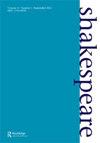细读:《科里奥兰纳斯》中傲慢、嫉妒的马蒂乌斯3.3.94
IF 0.2
3区 文学
0 LITERATURE, BRITISH ISLES
引用次数: 0
摘要
这篇细读利用新的证据来探索科里奥兰纳斯3.3.94的文本症结:科里奥兰纳斯“反对人民”的对开本印刷,但现代编辑通常更喜欢将第一个词修改为“猛烈抨击”。根据当代文本例子和最近的情感史研究,我认为保留对开本的阅读实际上可能是最明智的编辑选择。本文章由计算机程序翻译,如有差异,请以英文原文为准。
Close Reading: The Inveighing, Envying Martius in Coriolanus 3.3.94
ABSTRACT This close reading utilises new evidence to explore the textual crux of Coriolanus 3.3.94: the Folio prints that Coriolanus ‘enui’d against the people’, but modern editors usually prefer to emend the first word to ‘inveighed’. Drawing on both contemporary textual examples and recent research from the history of emotion, I argue that retaining the Folio’s reading may in fact be the wisest editorial choice.
求助全文
通过发布文献求助,成功后即可免费获取论文全文。
去求助
来源期刊

Shakespeare
Multiple-
CiteScore
0.30
自引率
33.30%
发文量
37
期刊介绍:
Shakespeare is a major peer-reviewed journal, publishing articles drawn from the best of current international scholarship on the most recent developments in Shakespearean criticism. Its principal aim is to bridge the gap between the disciplines of Shakespeare in Performance Studies and Shakespeare in English Literature and Language. The journal builds on the existing aim of the British Shakespeare Association, to exploit the synergies between academics and performers of Shakespeare.
 求助内容:
求助内容: 应助结果提醒方式:
应助结果提醒方式:


